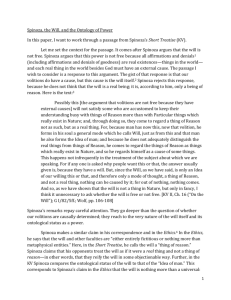Soviet Spinoza: Faith searching for understanding presented at
advertisement
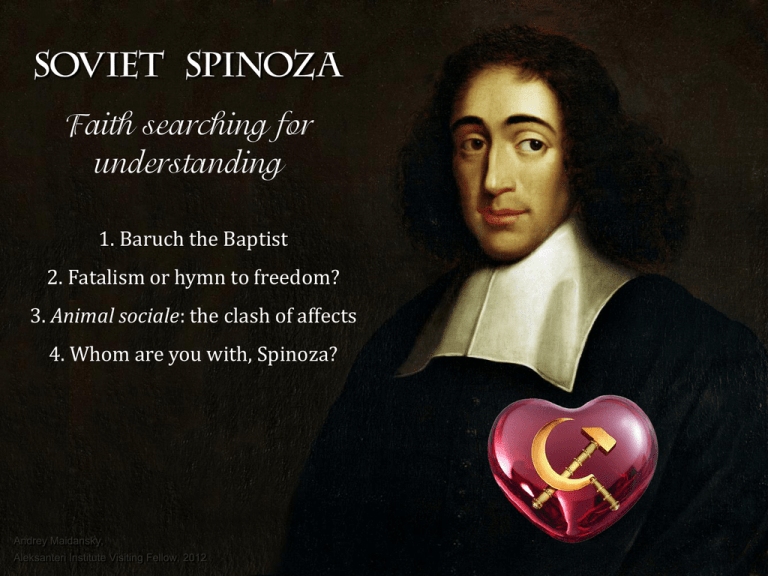
Soviet Spinoza Faith searching for understanding 1. Baruch the Baptist 2. Fatalism or hymn to freedom? 3. Animal sociale: the clash of affects 4. Whom are you with, Spinoza? Andrey Maidansky, Aleksanteri Institute Visiting Fellow, 2012 Spinoza’s substance is “the metaphysically disguised nature as separated from man” (Die helige Familie, 1845). Karl Marx Georgy Plekhanov — So in your opinion old Spinoza was right in saying that thought and extension were nothing but two attributes of one and the same substance? — “Of course”, answered Engels, “old Spinoza was quite right.” “The modern materialism is nothing other than more or less self-aware Spinozism.” “The materialism of Marx and Engels was a kind of Spinozism.” “Mechanists” vs. “Dialecticians” (the 1920s) Lubov’ Akselrod: Spinoza transferred his religious feeling onto the world order. “What an absurdity it is to assert that, in Spinoza, Substance is matter”. “Spinoza’s teaching, in its basic principles, appears to be a motionless and irreparable parallelism”. If Plekhanov offered to revise Spinoza in the materialistic spirit, then Abram Deborin tried to prove that Spinoza actually was a materialist, disguised himself in the “theological clothes”. Marxism is “a Neo-Spinozism of the XX century” (Ivan Luppol). Vasily Sokolov vs. Evald Ilyenkov (since the 1950s) Spinoza was “unable to advance the consistently materialistical point of view on Nature”. Spinoza is “a convinced materialist with a most strong aspiration for dialectics”. “Thought is only a property, a predicate, an attribute of body.” “Pantheistic form of Spinoza’s materialism” is an effect of “insufficient maturity of the bourgeois ideology”. Res cogitans (thinking thing) = “thinking body”. FATALISM Spinoza’s concept of freedom is fictitious, nothing more than verbal disguise of fatalism (Russian Neo-Kantians: Alexandr Vvedensky, Lev Lopatin et al.) “Mechanists”: Spinoza’s fatalism resulted from his religious feeling, not from his determinism. FREEDOM Valentin Asmus: “Spinoza himself decidedly rejected all fatalistic interpretations of his doctrine”. “This teaching is imbued not with metaphysical abstractness, but with the leaving breath of practice and activity”. To be free means to act reasonably (ex ratione agere), i.e. “to do those things which follow from the necessity of our nature, considered in itself alone.” (Ethica IV, propositio 59, demonstratio) Spinozism is the philosophy of Action, from head to toe. “The more active is man, the more external counteracting things are involved in his activity, subjecting him to reciprocal effects of them, – the higher is degree of his freedom. ” (Evald Ilyenkov). Freedom is acting in accordance with the universal laws of Nature. Valentin Asmus: “The dialectics of necessity and freedom is the most important key for understanding Spinozism.” In Spinoza, freedom is “the highest activity of man, absolutely independent of any external forces and stimuli.” Cultural Historical School in psychology Using the human, cultural means to regulate its own behaviour, man makes it free. The degree of our freedom is characterised by the power and extent of the internal, immanent determination of human activity. Lev Vygotsky: “We cannot help but note that we have come to the same understanding of freedom and dominance over self as Spinoza developed in his Ethics.” “To revive Spinozism in Marxist psychology” (L.S. Vygotsky). Political life is a clash of active affects and passions, confrontation of forces of solidarity and hostility. Tractatus politicus: “Insofar as they are assailed by anger, envy, or any affects of hatred, people are, by nature, enemies.” Ethica: “All should so agree in all things that the Minds and Bodies of all would compose, as it were, one Mind and one Body.” Empedokles: Cosmos is moved by Love and Strife Spinoza as “Marx without a beard” Lubov’ Akselrod: “Spinoza builds all his state legislation proceeding from the material interests... If to translate it into the Marxist language, it means that legal awareness of the individual is determined by economic being .” Isaak Razumovsky: “Let us translate the ideas of Spinoza into the language of historical materialism. And we get the elements of the teaching about adaptation of the social man to external environment and to work tools; the elements of theory about thingish and commodity fetishism; finally, the elements of the realistic teaching of Marx about the tasks which emerge and is posed only when the material conditions of their implementation become mature ”. Spinoza vs. Marx Spinoza looks at society mainly through the eyes of a psychologist, and Marx through the eyes of an economist. Social life, for Spinoza, is a struggle of affects, while for Marx, it is a struggle between classes, or material interests. Spinoza completely abstracts from class distinctions. He analyses two oppositions: rulers vs. people, and crowd vs. philosophers. In Spinoza there is no cornerstone of the materialist understanding of history, the concept of labour. And the very concept of history is not fully crystallised. Achilles heel of Spinozism is an “abstract man, considered outside the historical process” (Valentin Asmus). Qui bono? “Mechanists” & “Dialecticians”: Spinoza expressed the class interests of the bourgeoisie. Anatoly Lunacharsky: Materialism and rationalism are two “main principles of the bourgeois world”, having founded the brilliant embodiment in Spinoza’s system. But the bourgeoisie dared not drive these principles to their logical conclusion. Spinoza remained in solitude – he “appeared to be practically an outcast of his class”. Proletariat was, thus, destined to master and develop the revolutionary ideas of Spinoza. Spinoza as a weapon of the proletariat Vasily Sokolov: Denying the Calvinist “morality of accumulation”, Spinoza evolves the “passively moralising critique of contemporary bourgeois society”. Evald Ilyenkov: “Ethics” is a code of moral axiomatics of working class, and in no way of the class of dealers, hucksters and bankers. Hence its sincere democratic character.” The modernity of Spinoza “As a philosopher, Spinoza is our contemporary. And not because we have lagged behind by 300 years, but because he was 300 years ahead of his time” (Evald Ilyenkov).
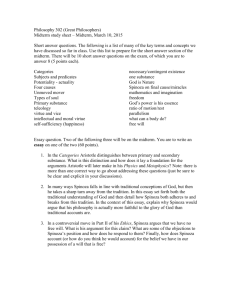
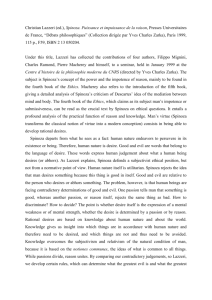
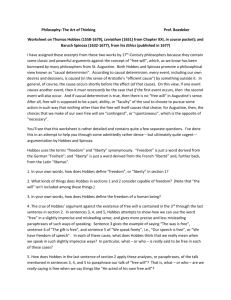
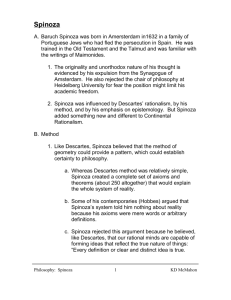
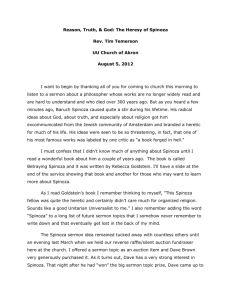
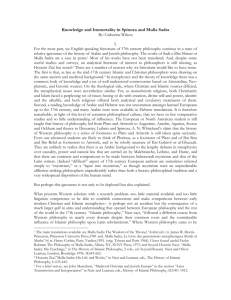

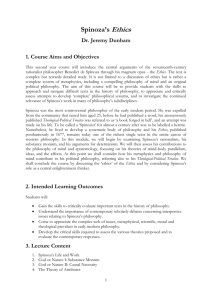

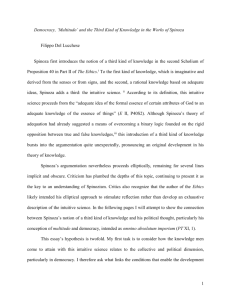
![Spinozistic Moral Imperatives [draft of a draft of a draft] Michael](http://s3.studylib.net/store/data/007162147_2-65eda3573329700cc44fcad90f1a3110-300x300.png)
